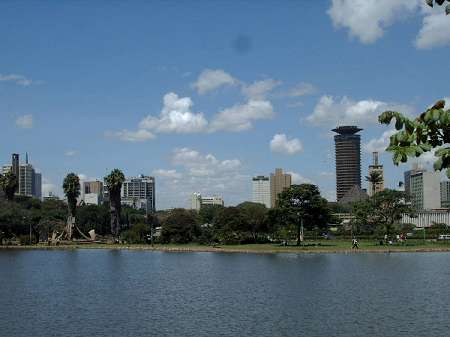Another World is Possible
by Jean Hayes | Sunday Jan 21st, 2007 3:26 PM  www.indybay.org
www.indybay.org
The 7th World Social Forum is underway in Nairobi, Kenya. This is a report from Jean Hayes, who is from Fresno Ca. Jean also attended last year's WSF in Caracas Venezuela. The photo below is Uhuru Park, where opening ceremonies were held.

With much music, dancing and drumming the 7th World Social Forum began Jan. 20 in Nairobi, Kenya. Last year, Forums took place in Caracas, Venezuela, Mali, and in Karachi, Pakistan. Opening ceremonies in Nairobi were held in Uhuru Park in the heart of the city and, with the Nairobi skyline in the background, people were treated to the sounds of Bob Marley's "Get Up, Stand Up" as well as the music of Brasil, Kenya, and many other countries. Speakers included a Palestinian woman who asked the audience to remember the 10,000 of her people in Israeli jails, an Italian man who asked forgiveness for what Europe did to Africa, and the keynote speaker, the former president of Zambia, whose talk centered around eradication of poverty and the hope of food on every table. He also urged Africans to say no to all forms of exploitation, and that no debt can be said to be fair. Punctuating the time between speakers was more music and chants of Viva Kenya!, Viva Cuba!, Viva Ghana!. Notably absent was Viva United States! Flags of many countries waved wildly in the mosh pit as participants danced to world music at the conclusion of the speeches.
The Forum was originally planned to take place in Uhuru Park, but then moved to Kasarani, a very large sports stadium on the outskirts of the city when it became apparent that it had outgrown the first venue. Only the opening and closing ceremonies remained in central Nairobi, a city designed for 300,000 people and now bursting with 3 million.
Day 2 of the Forum gave participants a chance to attend many different sessions centered around this year's theme, "People's Struggles, People's Alternatives". Noted presenters included Dr. Vandana Shiva, who spoke on the broken promises of the Green Revolution and the hope in the return of bio-diversity in some of India's farming regions where the crop yields are twice or three times as much as fields where pesticides and chemical fertilizers are used.
Other notable presentations included a panel on Human Rights moderated by Mary Robinson, former president of Ireland, and human rights crusader. Also of note was an afternoon presentation by the Kenya Debt Relief Network entitled: Cut funding to the World Bank - How to bring about radical reforms. It was pointed out that the landing of Colombus's three ships in 1492 in the Americas brought about much negative change, and that the three "ships" named the IMF, the World Bank, and the WTO were a real danger to Africa.
All around the outside of the massive Kasarani Stadium, grassroots organizations set up booths with information on such things as organic farming, AIDS education, labor unions, Kenyan women's groups, and a host of other social justice organizations.
Looming behind the progressive activities at the Forum were other issues that are difficult for many Kenyans to overcome. Although they were addressed at this world gathering, only time will tell if they can be turned around. A case in point is the booming flower industry, roses in particular, that sends a huge volume of flowers to the world's largest market in Amsterdam each day. This industry is centered in the Rift Valley region of Kenya, occupying huge numbers of acres, all of which are owned mostly by Europeans. Since flowers must look good, chemicals are used in abundance to kill pests in the giant greenhouses, and the demand for water for irrigation is great. Much of this water comes from either the two rivers that empty in to Lake Navaisha, close to the flower farms or from the lake itself which is slowly drying up. The ecosystems here are damaged and, unless measures are taken soon to solve the environmental problems, the land will be unfit for any farming. These issues and others like them were addressed at the Forum in the hope that the innovative thinking here can produce a solution though the problem is rooted in colonialism and the fact that Europeans still own this land in the Rift Valley. Some attempts are being made to organize unions on the farms but the idea has a long way to go.
On the brighter side, Kenya is home to many progressive women's groups who are working for positive change. They organize community gardens, do AIDS education, and offer themselves as support groups when needed. One especially powerful group is the Daughters of Mumbi, who had a visible presence at the World Social Forum with their well-stocked information booth and food court. These women and other similar groups such as the women of the Greenbelt Movement seem to be the catalyst for change in the country. The groups have a chant they do at meetings and presentations to emphasize a point when one of them if speaking. All chant "Wa Sa Su!!" meaning, "A woman is speaking!"
On January 26 the 7th World Social Forum will end and those attending will return to their home countries having had the rich experience of being with like-minded people who believe that another world is possible. All this taking place in a rich emerging nation whose people realize the value of self-sufficiency and not dependance on promises made by the WTO, the IMF, or the World Bank.